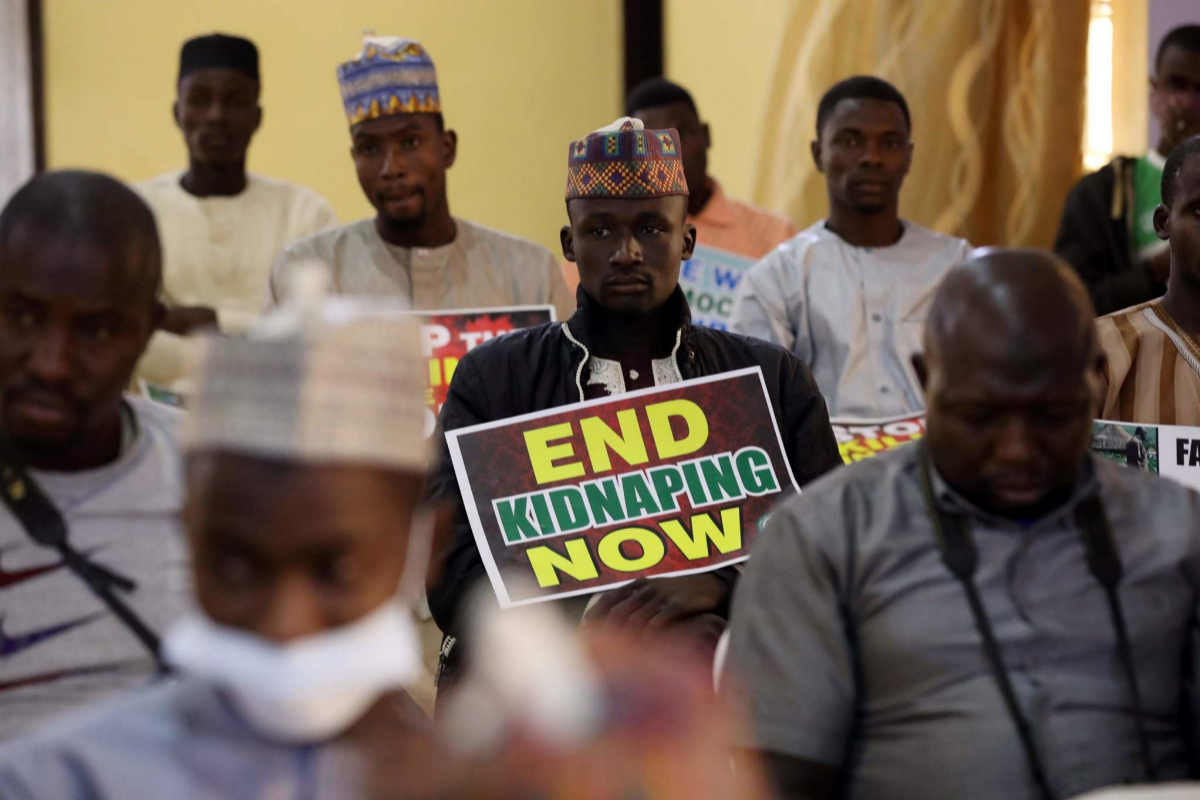Correspondent's gaze Boko Haram empties Nigerian classrooms
Special: The War Against Boko Haram
A total of 344 students kidnapped on December 11 after an attack on a school in northwestern
Nigeria
were released on Thursday, authorities said.
The jihadist group Boko Haram claimed responsibility for the kidnapping of the students following the attack on the Government Science Secondary School, a boys' school located in the city of
Kankara,
in the state of
Katsina.
Speaking to local media, Katsina Governor
Aminu Masari
said that the children had been in a forest in
Tsafe,
in the neighboring state of
Zamfara,
since they were kidnapped by armed men.
The students are on their way to Katsina, where they should arrive this Friday, and are expected to join their families after a medical check-up.
"We are very happy to announce the rescue of the Kankara boys from their kidnappers. 344 are now with the security agencies and will be transferred to Katsina tonight,"
said the governor
on his
Twitter account.
"They will be given proper medical care and attention before they are reunited with their families," Masari added, without going into details about the release of the students.
Nigerian President Muhammadu Buhari "welcomed the release of the kidnapped students" on his Twitter account.
"This is a great relief for the whole country and the international community. The whole country thanks Governor Masari, the intelligence agencies, the Army and the Police," added Buhari.
KOLA SULAIMONAFP
A VIDEO OF BOKO HARAM
The release was announced hours after Boko Haram posted a video allegedly showing several of the more than 300 kidnapped students.
In the six and a half minute video, the kidnappers teach the children, some of them crying, and claim that they are in good health, according to the local information portal
HumAngle,
which obtained the tape and specializes in conflicts.
"We have been captured by the gang of
Abu Shekau (Abubakar Shekau, leader of Boko Haram).
Some of us were killed," says a visibly distraught schoolboy in English and Hausa (a language spoken in northern Nigeria), while listening to background a voice that seems to tell him what to say.
The boy urges the Nigerian government to reach an amicable agreement with his kidnappers and advises against the use of military force to try to rescue the captives.
The student appears surrounded by dozens of children, covered in dust and apparently in a forest area.
Boko Haram leader Abubakar Shekau speaks at the end of the video, noting that many people thought he was lying when he claimed the kidnapping of schoolchildren in an audio this week.
"Even if I hadn't said anything, here are my people talking and here are your boys talking too," the terrorist declared.
Boko Haram claimed responsibility on Tuesday for the kidnapping of more than 300 students from the Government's Secondary School of Sciences.
Although the authorities claimed to have established negotiations with the kidnappers, the group insisted that they did not make demands or set conditions to release the students.
The
jihadists
were expected to
demand the payment of a ransom
and the release of some of their members from the custody of the security forces, according to experts, but what has finally happened has not been revealed.
Authorities initially attributed the incident to armed bandits, who often attack in Katsina and other northwestern states.
The
hashtag #BringBackOurBoys
("Bring back our boys")
became popular on Nigerian social networks
, in a clear allusion to the international campaign "Bring back our girls" used after the 2014 abduction of 276 children under one interned in Chibok - northeast Nigeria - at the hands of Boko Haram.
To this day, the whereabouts of at least 112 of the girls are still unknown.
Boko Haram was created in 2002 in
Maiduguri
(capital of the northeastern state of
Borno
) by spiritual leader
Mohamed Yusuf
to denounce the abandonment of the north of the country by the authorities.
At that time, he was carrying out attacks against the Nigerian Police, representing the State, but since Yusuf was killed by agents in 2009 the group entered a radicalization spiral.
Since then, the northeast of Nigeria has been mired in a state of violence provoked by Boko Haram, which seeks to impose an Islamic-style state in Nigeria, a country with a Muslim majority in the north and a predominantly Christian country in the south.
During its campaign, the group
has killed more than 27,000 civilians
and caused nearly two million displaced people, according to the
UN.
According to the criteria of The Trust Project
Know more
Boko haram
Nigeria
Twitter
UN
Attacks
Kidnappings
The look of the correspondent Boko Haram empties the classrooms of Nigeria
AfricaThe director of the WHO before the accusations of the Ethiopian Army: "I am on the side of peace"
RussiaA man surrenders to police after threatening to kill six children in St. Petersburg
See links of interest
News
Programming
Translator
Work calendar
Films
Topics
Deportivo de La Coruña - El Ejido
Navalcarnero - CD Badajoz
Ribadumia - Cádiz
Anaitasuna - Getafe
AD San Juan - Granada CF

